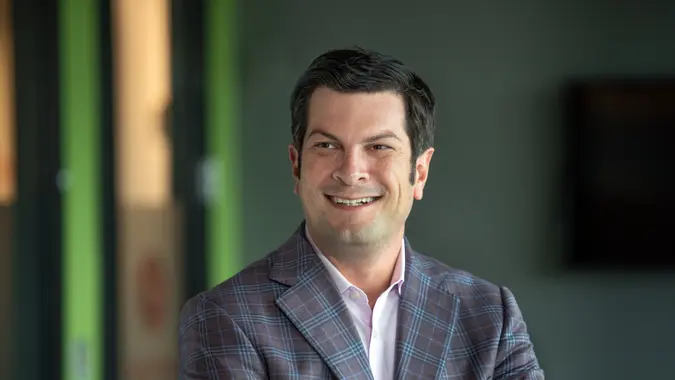The Top 4 Retirement Questions I Get Asked as a Financial Advisor (and How I Answer Them)

Commitment to Our Readers
GOBankingRates' editorial team is committed to bringing you unbiased reviews and information. We use data-driven methodologies to evaluate financial products and services - our reviews and ratings are not influenced by advertisers. You can read more about our editorial guidelines and our products and services review methodology.

20 Years
Helping You Live Richer

Reviewed
by Experts

Trusted by
Millions of Readers
Retirement planning is often a primary concern when clients meet with financial advisors — and that goes for clients of all ages. Brad Sherman, president of Sherman Wealth Management, primarily works with couples in their 30s and 40s, but many are already thinking ahead to their retirement years.
Here are the most common retirement planning questions Sherman gets asked — and how he answers them.
How Can I Account for Inflation in My Retirement Plans?
“A lot of people are looking at what dollars will be worth in the future and the purchasing power of those dollars,” Sherman said. “Inflation has obviously been very top of mind for most folks over the last 18 or 24 months.”
Sherman notes that many people do have to adjust their current plans to account for the higher rates of inflation we have been experiencing.
“A lot of retirement plans assumed maybe 0% or 1% or 2% as it relates to inflation, and we’re obviously seeing that being changed,” he said. “A lot of folks actually need that analysis of, this is what we have in today’s dollars and what will it be worth — running those types of modeling and scenarios would be the answer to how we’re helping folks.”
How Should I Balance Saving for Retirement With Saving for Shorter-Term Goals?
Sherman said that many of his clients are working on other goals — such as saving for their kids’ college education or a down payment on a home — in addition to saving for retirement, and may not know the best way to prioritize.
“It’s a lot about education about the trade-offs,” he said. “If they have a tight budget, we go through the opportunity cost and the trade-offs of, [for example], if you have to delay putting an extra $5,000 toward your 401(k) because you want to prioritize your children’s education, this is [how it] may impact the retirement figures.”
Sherman notes that there is no one-size-fits-all approach to these scenarios.
“Some people are fine with [cutting back on retirement savings] because they want to prioritize education or a house purchase or something else that they’re trying to do for the now,” he said. “[Other] people might say, ‘Oh no, we don’t really want to do that.’ Then maybe the outcome is the kids may take out student loans. I just educate them on the trade-offs, making sure that they understand the pros and cons of each, and help guide them through some of those numbers.”
How Can I Create a Holistic Retirement Plan?
Sherman said that many of his clients in their 30s and 40s envision a different retirement than what older generations may have desired, and this affects how he goes about helping them create a holistic retirement plan.
“A lot of people our age view retirement a lot differently than our parents’ generation, [who have a view] of sitting at a beach doing nothing,” he said. “A lot of people want to be a bit more active, or maybe they want to work part-time. Maybe they’re a small business owner and they don’t want to walk away [completely] at retirement age, but they want to slow down.
“I think the ‘semi-retirement’ is an interesting concept of late for folks our age, who don’t view themselves as doing absolutely nothing, but may want to have a different career than they’re potentially doing now.”
If a client plans to work in retirement, this will affect how much they will need to save to subsidize their lifestyle. Another factor that can affect retirement planning is the desire to travel, which Sherman said is common among his clientele. In addition, more people never plan to own a home and prefer to rent, which will also affect the way a retirement plan is created.
“What we’re doing is a holistic financial plan, laying out what’s important to each client individually and not looking at them as a mass grouping,” Sherman said. “Everyone has unique needs and unique circumstances.”
What Regulatory Changes Do I Need To Be Aware Of?
The IRS regularly adjusts its limits on how much you can contribute to retirement savings accounts, but many of Sherman’s clients aren’t aware of these changes.
“One of the things that’s important is education around limits,” Sherman said. “The 401(k) [contribution] limit was raised in 2023. We’re still seeing people who haven’t made that adjustment to their pay stub or contribution amount for those that want to max out. A lot of people are still confused about income limits for [different retirement accounts]. Education and telling people of the different changes [is important for retirement planning].”
More From GOBankingRates
 Written by
Written by  Edited by
Edited by 

























